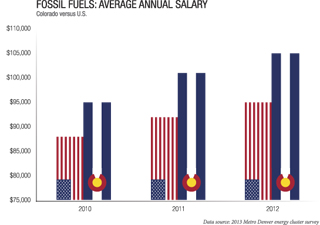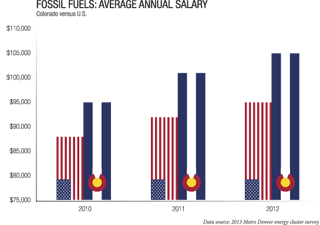

Denver: Top draw for millennials
ColoradoBiz Staff //December 1, 2014//
(Editor’s note: This content is sponsored by Coloradans for Responsible Energy Development (CRED).
 Chris Wright’s companies – and the technologies they’ve spawned – have played a big role in the energy revolution of recent years. Pinnacle Technologies, which he founded and presided over for 14 years, created the hydraulic fracture mapping industry and developed the world’s most widely used fracture modeling system. The company’s lead role in the innovation of fracturing practices led to commercialization of shale gas production – initially the Barnett Shale with Mitchell Energy.
Chris Wright’s companies – and the technologies they’ve spawned – have played a big role in the energy revolution of recent years. Pinnacle Technologies, which he founded and presided over for 14 years, created the hydraulic fracture mapping industry and developed the world’s most widely used fracture modeling system. The company’s lead role in the innovation of fracturing practices led to commercialization of shale gas production – initially the Barnett Shale with Mitchell Energy.
This took place in California, where Wright based his operations. But three years ago the entrepreneur and investor moved his latest venture, the exploration and production company Liberty Resources, to Denver.
“We’ve hired 600 people here in the last four years, and we’ll hire 600 more in the next three,” said Wright, an MIT grad, who related how at least two groups of enterprising types he knows – one in Oklahoma City, the other in California – recently left their firms to start their own companies.
“And where did they move?” Wright asked rhetorically. “They moved to Denver. The guys from Oklahoma City, their oil and gas production is in Texas and Oklahoma, but if you’re going to start anew, why don’t you go to a place where you want to live? And where do young people with college degrees that are go-getters want to live? They want to have access to the Colorado mountains.”
Wright described the draw of ambitious millennials to Colorado as a snowball effect – the “Denver effect,” he called it. “They want to go where all the other young kids are. It’s the place to be if you want to build a business.”
Wright, who grew up in Colorado, emphasized one last point, a takeaway, about his move to Colorado: “Government matters,” he said. He explained that in California, restrictions on hydraulic fracturing had become “not really about protecting the environment but about sounding right. That’s not a place people want to invest in business. Colorado, I think, has a great balance. It’s a state that wants to grow. Native Coloradans want to see the state succeed. Of course, all of us want to protect the environment. Regulation’s very important, because there are guys who cut corners, who don’t do things well. When they do bad things, we all bear the brunt of that. I would say the vast majority of oil and gas companies want firm, strict, sensible regulation, because that prevents the bad guys from making us look bad and hurting our industry.”
Wright’s perceptions of the talent pool in Denver and more broadly, the Rocky Mountain region, are backed up by John Sikaitis, national research director for JLL. Sikaitis calls Denver the business capital of the five-state Rocky Mountain region – and not only because it is the largest city within a 600-mile radius.
“You look at the education attainment level for Denver and Colorado, and it’s double that of the rest of the peer states around this area,” he said, adding that it also boasts the highest income levels and the lowest median age. Millennials – those between 20 and 34 years old – comprise 22 percent of the overall Denver metropolis and represent the highest millennial growth of any metropolitan area in the country since 2007.
“That’s impacting jobs in a very significant way,” Sikaitis said. “More people want to come here, more businesses want to come here. Denver has seen now 49 consecutive months of year over year employment increases. We’ve seen 40,000 jobs created in the past 12 months. And we’ve seen an employment growth rate of 3.2 percent that’s 1 ½ times the U.S. average. More important, when we look at the next 18 months we see growth of 4.6 percent; that’s two times the U.S. average.
Much of that job growth will be owed to oil and gas development – not only those companies, but the businesses that flourish because of energy development.
“It’s not just energy companies, it’s that halo effect that supports them,” said Lindsay Brown, a senior vice president at Jones Lang LaSalle. “It’s the law firms, the engineering firms, the real estate firms, accounting firms, the business leaders in the region that are impacted by energy.”
Burrtech, an IT service-management consulting firm based in Greenwood Village, is one company that has felt a favorable impact from energy. About 40 percent of Burrtech’s client base is the oil and gas industry.
“It’s grown over the years, and we’re trying to grow it further because it’s obviously a pretty active market sector right now,” said CEO David Raymes.
Burrtech builds and manages networks, servers, programs and applications for growing companies. “We basically design their network systems and then oversee and manage it in a proactive way,” Raymes said, explaining that one of its many services allows companies to move information from field operations through network databases so the right people in the office can see what’s going on in the field.
Though the company has been around since 2000, Raymes only came on as a majority owner and CEO early this year. “Right now, we’re at about a dozen people, and we have contractors also working for us,” he said. “But we are looking to grow it significantly … to hundreds of people over the next five to seven years.”
Raymes said he thinks the “compromise” that resulted in the four fracking-related measures being taken off the November ballot in favor of a 21-member task force that will make recommendations to the legislature was probably a positive for business.
The energy boom centered in Northern Colorado has some staying power, Raymes believes, fracking bans notwithstanding. “I think it does have staying power because I think from a national and global perspective it’s contributing to the U.S. getting more energy-independent from foreign sources, which is almost the case right now. If we want to maintain that, which seems like a good idea to me, it should have some staying power.
“The fracking process – that’s not exclusive to Colorado by any means. It’s going on in the Dakotas, Pennsylvania, Ohio, West Viriginia, Texas … all over the place in the U.S., so if something’s going happen in Colorado where it just comes to a screeching halt, it’s probably going to happen elsewhere in the United States. I just don’t see that happening.”






















